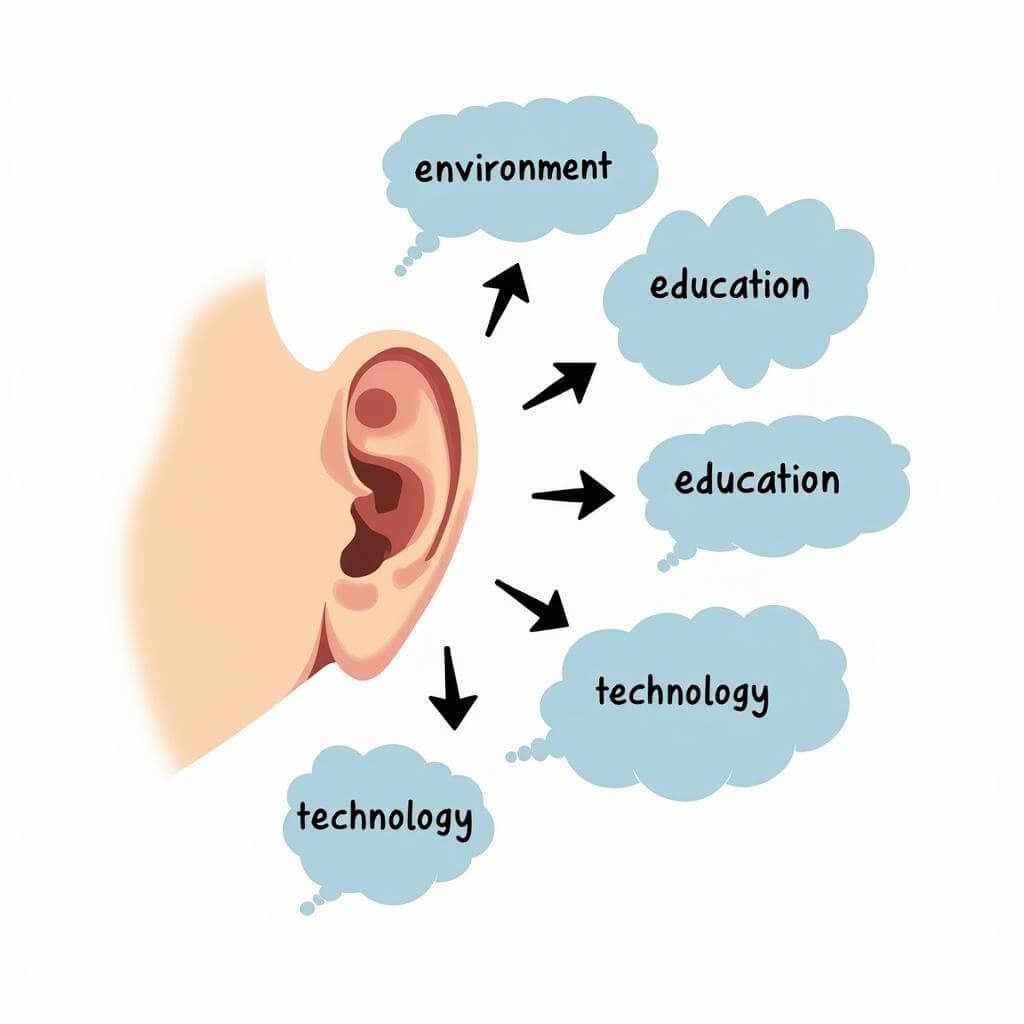IELTS Listening can be challenging, especially when it comes to recognizing key information in long audios. As an experienced IELTS instructor, I’ve seen many students struggle with this aspect of the test. In this comprehensive guide, we’ll explore effective strategies to help you excel in identifying crucial details during extended listening passages.
Understanding the Importance of Recognizing Key Information
Recognizing key information in long audios is a critical skill for IELTS success. It not only helps you answer questions accurately but also improves your overall comprehension. Let’s dive into the techniques that will enhance your ability to identify and retain essential details.
The Challenge of Long Audios
Long audios in IELTS Listening can be overwhelming due to their duration and complexity. They often contain a wealth of information, making it difficult to distinguish between relevant and irrelevant details.
Why Recognizing Key Information Matters
Identifying crucial points in extended recordings is essential for several reasons:
- It allows you to answer questions more accurately
- It helps you manage your time effectively during the test
- It reduces stress and increases confidence in your listening abilities
Strategies for Recognizing Key Information in Long Audios
1. Develop Active Listening Skills
Active listening is the foundation of recognizing key information. Here’s how to cultivate this skill:
- Focus intently on the audio without letting your mind wander
- Visualize the information as you hear it
- Mentally summarize main points as the speaker progresses
Dr. Emily Chen, a renowned IELTS expert, emphasizes, “Active listening is not just hearing words; it’s about engaging with the content and processing information in real-time.”
2. Utilize Prediction Techniques
Predicting content can significantly improve your ability to recognize key information:
- Read questions beforehand to anticipate relevant topics
- Look for clues in question types (e.g., multiple choice, fill-in-the-blank)
- Use your knowledge of common IELTS topics to make educated guesses
3. Master Note-Taking for Long Audios
Effective note-taking is crucial for managing information in extended recordings:
- Use abbreviations and symbols to write quickly
- Focus on key words and phrases rather than full sentences
- Organize your notes spatially to reflect the structure of the audio
Pro Tip: Practice your note-taking skills with TED Talks or podcasts to simulate long IELTS audios.
4. Identify Signpost Language
Recognizing linguistic cues can help you pinpoint important information:
- Listen for transitional phrases like “however,” “on the other hand,” or “in conclusion”
- Pay attention to emphasis words such as “importantly,” “significantly,” or “crucially”
- Note when the speaker’s tone or pace changes, as this often signals key points
5. Develop Contextual Awareness
Understanding the context helps in recognizing relevant information:
- Familiarize yourself with various accent types
- Study common IELTS topics to build background knowledge
- Practice listening to different types of long audios (lectures, interviews, discussions)

6. Improve Your Concentration
Maintaining focus during long audios is essential for recognizing key information:
- Practice mindfulness techniques to enhance your concentration
- Gradually increase the duration of your listening practice sessions
- Eliminate distractions during your study time
7. Enhance Your Vocabulary
A robust vocabulary aids in quickly recognizing and understanding key information:
- Study academic word lists relevant to IELTS
- Learn synonyms and paraphrases commonly used in the test
- Practice using new words in context to reinforce your understanding
Dr. Michael Thompson, an IELTS preparation specialist, states, “A strong vocabulary is like a key that unlocks the meaning of complex audio passages, making it easier to identify crucial information.”
Practical Exercises for Recognizing Key Information
To hone your skills in identifying essential details, try these exercises:
- Listen to a long audio and write down five main points
- Practice summarizing 10-minute lectures in 2-3 sentences
- Engage in managing time during group listening exercises to simulate test conditions
- Create mind maps of key information after listening to extended passages
- Participate in discussions about the content you’ve heard to reinforce your understanding
Common Pitfalls to Avoid
When working on recognizing key information in long audios, be aware of these common mistakes:
- Fixating on unfamiliar words instead of grasping the overall meaning
- Trying to understand every single detail rather than focusing on main ideas
- Neglecting to use context clues to infer meaning
- Failing to adapt your listening strategy based on the question types
Conclusion
Mastering the art of recognizing key information in long IELTS listening audios is a skill that can significantly boost your test performance. By implementing these strategies and consistently practicing, you’ll develop the ability to efficiently extract crucial details from extended recordings. Remember, improvement comes with time and dedication, so stay persistent in your IELTS listening preparation.
Frequently Asked Questions
How long are the ‘long audios’ in IELTS Listening?
IELTS Listening long audios typically last between 5-7 minutes, usually found in Sections 3 and 4 of the test.
Can I take notes during the IELTS Listening test?
Yes, you are allowed and encouraged to take notes during the IELTS Listening test. Use the question booklet for note-taking.
How can I improve my concentration for long audios?
Regular practice, mindfulness techniques, and gradually increasing listening duration can help improve concentration for extended recordings.
What if I miss key information during the audio?
Stay calm and focus on the next question. Sometimes, information is repeated or can be inferred from context later in the audio.
How often should I practice listening to long audios?
Aim to practice with long audios at least 3-4 times a week, gradually increasing the frequency as your test date approaches.
Are there specific topics I should focus on for long IELTS audios?
While topics vary, common themes include academic lectures, environmental issues, historical events, and scientific concepts. Familiarize yourself with a wide range of subjects.
How can I ensure I’m recognizing the correct key information?
After practice sessions, review your notes against the audio transcript or discuss with a study partner to verify your understanding of key points.